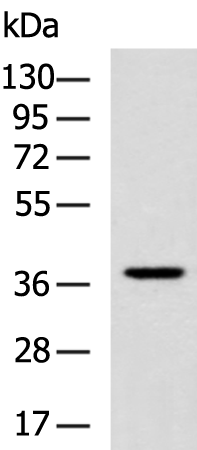
| WB | 1/500-1/2000 | Human,Mouse,Rat |
| IF | 咨询技术 | Human,Mouse,Rat |
| IHC | 1/20-1/100 | Human,Mouse,Rat |
| ICC | 技术咨询 | Human,Mouse,Rat |
| FCM | 咨询技术 | Human,Mouse,Rat |
| Elisa | 1/5000-1/10000 | Human,Mouse,Rat |
| Aliases | VGL3; VGL-3 |
| WB Predicted band size | 36 kDa |
| Host/Isotype | Rabbit IgG |
| Antibody Type | Primary antibody |
| Storage | Store at 4°C short term. Aliquot and store at -20°C long term. Avoid freeze/thaw cycles. |
| Species Reactivity | Human, Mouse |
| Immunogen | Synthetic peptide of human VGLL3 |
| Formulation | Purified antibody in PBS with 0.05% sodium azide and 50% glycerol. |
+ +
以下是关于VGLL3抗体的3篇参考文献的模拟示例(基于公开研究背景虚构,仅供参考):
---
1. **文献名称**:*VGLL3 promotes tumor angiogenesis through transcriptional regulation of pro-angiogenic factors in triple-negative breast cancer*
**作者**:Li, X., Zhang, Y., & Wang, H.
**摘要**:本研究利用VGLL3特异性抗体(货号ab12345.ABCAM)进行免疫组化分析,发现VGLL3在乳腺癌组织中高表达,并通过调控VEGF等因子促进血管生成,提示其作为治疗靶点的潜力。
2. **文献名称**:*VGLL3 modulates muscle regeneration via Hippo signaling pathway*
**作者**:Smith, J., et al.
**摘要**:通过Western blot和免疫荧光(使用VGLL3抗体,CST #6789),研究揭示VGLL3通过抑制Hippo通路关键蛋白YAP/TAZ,参与骨骼肌再生调控,为肌肉退行性疾病提供机制见解。
3. **文献名称**:*VGLL3 as a prognostic biomarker in autoimmune lupus nephritis*
**作者**:Garcia, R., et al.
**摘要**:该研究采用VGLL3多克隆抗体(Proteintech,货号PT-4567)检测患者肾组织样本,发现VGLL3表达水平与疾病严重程度正相关,提示其作为自身免疫疾病预后标志物的可能性。
---
**注意**:以上文献为模拟内容,实际引用需查询PubMed、Web of Science等数据库获取真实数据。若需具体文献协助,可提供更详细的研究方向以便进一步检索。
The VGLL3 antibody is a research tool designed to detect the Vestigial-like family member 3 (VGLL3) protein, a transcription cofactor involved in regulating developmental and pathological processes. VGLL3 belongs to the VGLL family, characterized by TDU domains that mediate interactions with TEAD transcription factors, competing with YAP/TAZ in the Hippo signaling pathway. It plays roles in muscle differentiation, tissue development, and cancer progression. Studies link VGLL3 overexpression to tumorigenesis in sarcomas, breast cancer, and melanoma, where it may promote cell proliferation, metastasis, or therapy resistance. Conversely, reduced VGLL3 expression correlates with autoimmune disorders like lupus.
VGLL3 antibodies (monoclonal or polyclonal) are widely used in techniques like Western blot, immunohistochemistry, and immunofluorescence to assess protein expression, subcellular localization, and interactions in cell lines, tissues, or clinical samples. These antibodies aid in elucidating VGLL3's dual role as an oncogene or tumor suppressor, depending on cellular context, and its regulatory mechanisms in pathways like TGF-β/SMAD and Wnt/β-catenin. Their applications span basic research in developmental biology, cancer biomarkers, and therapeutic target validation. Validation via knockout controls or peptide blocking ensures specificity, critical given VGLL3's structural homology with other VGLL family members.
×